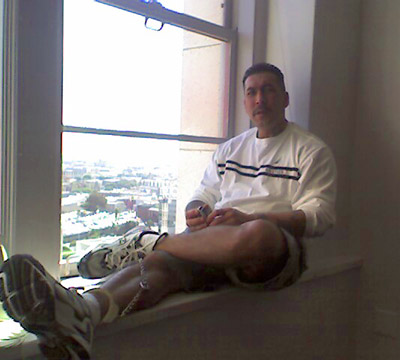Most prison gangs establish elaborate codes and rules. But Enriquez says getting members to adhere to all the rules is another matter.
Enriquez waits for a 2007 meeting with law enforcement agents at the federal court building in Los Angeles. He is wearing leg irons.
Photo courtesy Rene EnriquezRene Enriquez: We have seven rules in the organization. You can't be a rat, coward or homosexual. Those are the three hard rules. You commit an infraction on these, you die. The other ones we call gray rules. Those are: You can't steal from a brother; You can't have sex with a brother's wife or girlfriend; You can't raise your hand against a brother without organizational sanction; You can't encroach upon another's turf. But everybody violates the rules. And herein lies the problem.
From almost day one of their lives, these men were rule-breakers. The Mexican Mafia members, they broke the rules of the familial unit, of society, of school, they were kicked out of school, ultimately they were placed in juvenile hall, from there they got out and went to prison. In prison they broke the rules of prison society and were placed in the security housing unit or whatever hole was available at the time. Once in the hole, they come to the light of Mexican Mafia members, they draw the attention of Mexican Mafia members and they're inducted into the organization. Once they get into the Mexican Mafia, they're expected to follow the rules. They become lords of discipline. And therein lies the problem. They're rule-breakers. How can these individuals who have every form of personality disorder, egocentric, megalomaniacal, low self-esteem, these individuals, sociopaths, psychopaths, how can they follow rules? How can they follow all these rules when they've been rule-breakers all their lives? That's what struck me as contradictory about the organization. And that's why the group can't live up to its own ideals.
Most of the Mexican Mafia's leadership, including Rene Enriquez, was locked down in stark isolation cells by the early 1990s. Group leaders still managed to get messages out allowing them to control drugs, extortion and other crimes throughout the prison system and on the streets. But slowly, political rifts emerged. Enriquez says his life became consumed with settling accounts with other Mexican Mafia members, something he calls "campaigns."
Enriquez: And the last campaign I had to deal with it was pretty ugly. They were talking about killing family members. It's ridiculous. This is a concept that has never been entertained by the Mexican Mafia. But they started talking about killing moms and fathers and anybody that they could to get at you. Then I knew it was real bad. I know that this organization is taking a turn, it's going to go through another metamorphosis, it's going to become something different from what I was initially a part of. That's when I decided (to leave.) ... I couldn't take the step, though. It's like, you've taken 20 years of your life to create the persona that you are. This is your image. This is who you are. So in a sense, it's like committing suicide. I couldn't take the step. I remember one day I was talking to a visitor, ... and I said, you know, "What if I left?" We have to talk in this carnival talk, in the sense that it's hidden in this coded conversation (note: in the visitation rooms prison gang members talk in code words, or cryptically, to circumvent surveillance). "What if I left, what if I wasn't anybody anymore?" And it didn't matter to her. But I still couldn't do it. How could I go up and say, ... "I want to defect from the gang." I couldn't envision myself doing that, I didn't know how to do it.
American RadioWorks: What was the hardest part of dropping out? You were betraying your friends. Was that the hardest?
Enriquez: No. I think destroying myself, my gang alter ego, was. You know, all these mobsters are egocentric. Huge senses of who they are. I mean, you put a mobster in a room and his personality fills the room. They have these grandiose ideas of who they are and what the mob is. So in a sense, killing off "Boxer," the gang member, was the hardest part. That's all I ever knew. That's who I was. That's who I thought I was. I had this concept that because I was a Mexican Mafia member, because I was upper echelon, because I ran a big crew, because I had the power to kill people, I was special. That I was a special individual. And I'm this elitist guy. I'm one of the very few who makes it to the top of the mob and lasts for x number of years. I was in there for 18 years. So this is my perception of who I was. I wasn't Rene Enriquez the father, the brother, the husband, the friend, the man. It was Boxer the Mexican Mafia member. So in a sense I had this surreal experience that I was mourning my own death. That's how I felt. I had this depression during the first few weeks. Like I was alive but I was mourning my own death.
ARW: People say you never smiled until after you defected.
Enriquez: [Laughs] You put up the façade. You put up this hard image. And that's part of who you are. So I smile now.
ARW: Were you aware of that transition?
Enriquez: Never. Ever. But I'm happier. I'm content. Every day's a blessing for me. I call it another day in paradise. Every day above ground is a good day.



